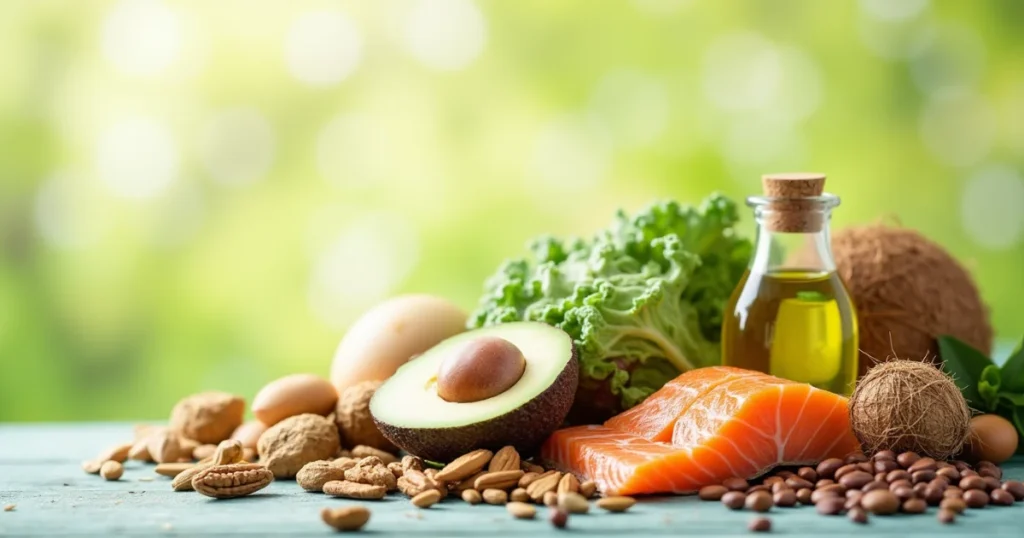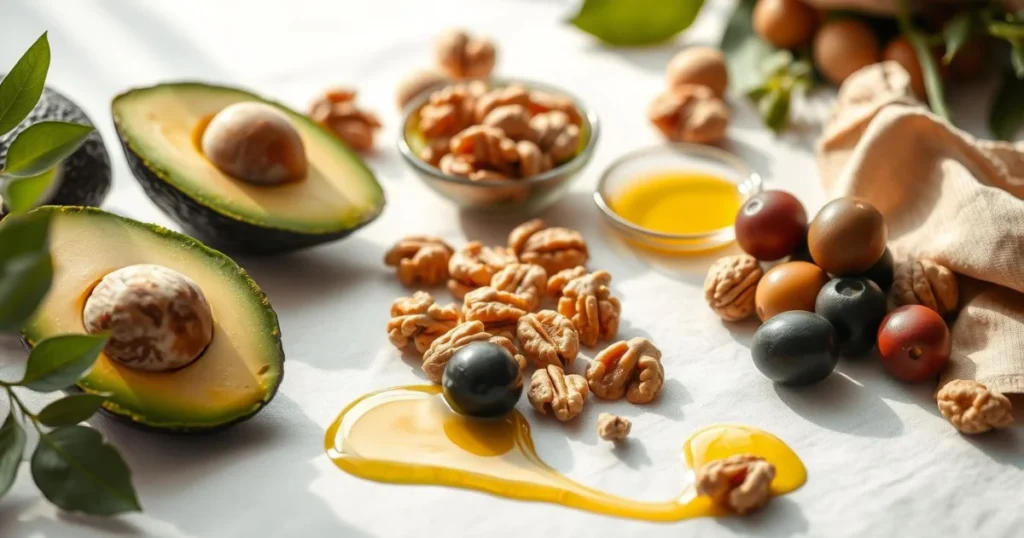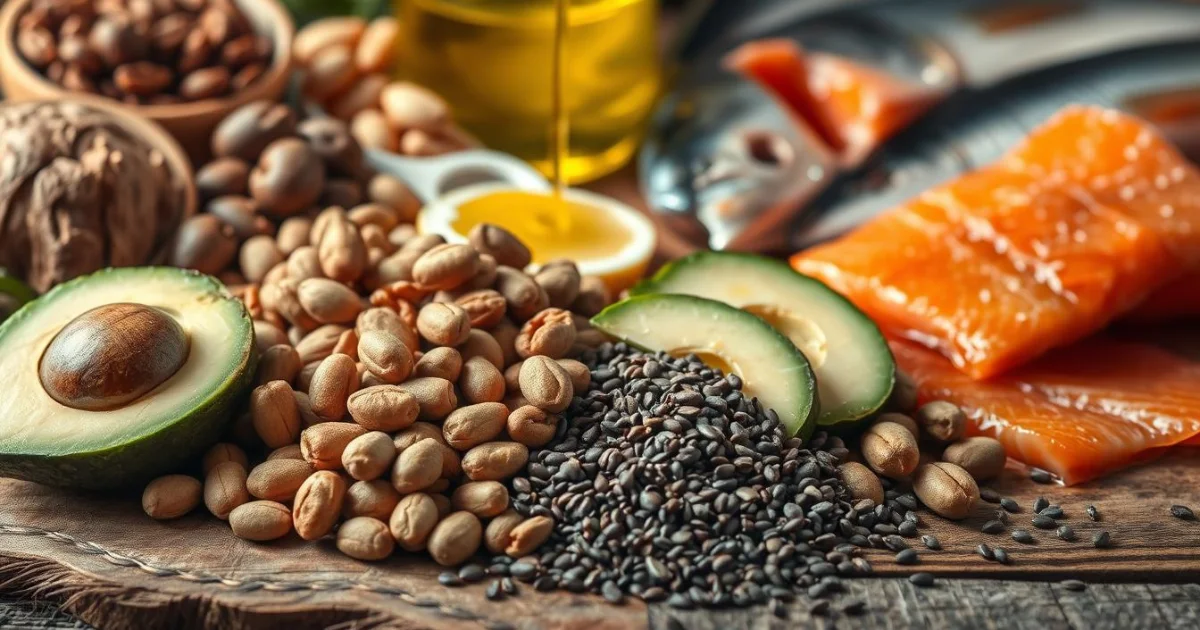Healthy Fats: Fueling Your Body the Right Way
Understanding the role of healthy fats is key to good health. They fuel our bodies and offer many benefits. Healthy fats are vital for our health, supporting heart and brain functions.
Healthy fats are important for our daily lives. Choosing the right fats is a big step towards better health. They are not just a choice, but a must for our bodies.
Table of Contents
Understanding Healthy Fats: The Basics
Healthy fats are key to a balanced diet, giving the body energy and supporting its functions. It’s important to know what they are and how they differ from unhealthy fats. Good fats vs bad fats is a topic of debate, and understanding the difference is crucial for health. Foods like nuts and avocados are full of nutrients and easy to add to your diet.
The best healthy fats offer nutrients and lasting energy. Omega-3 fatty acids, found in fatty fish, and monounsaturated fats, in olive oil, are examples. Knowing about different fats and their effects helps in making better diet choices.
There are several methods to incorporate healthy fats to your diet. Here are some top sources:
- Fatty fish, such as salmon and sardines
- Seeds and nuts, like chia seeds and almonds
- Avocados and olive oil
These foods are not just full of healthy fats but also packed with other essential nutrients. They are a terrific addition to a balanced diet.
The Science Behind Good Fats vs Bad Fats
Knowing the difference between good fats and bad fats is key for a healthy diet. Nourishing Fats give us energy, help us absorb nutrients, and keep our hearts healthy. They are very important for our well-being.
Good fats help reduce inflammation, boost brain function, and support cell growth. Bad fats, like trans fats, can harm our hearts and overall health. Eating foods high in omega-3 fatty acids, like salmon and walnuts, can help us get the good fats we need.
Here are some important facts about good and bad fats:
- Good fats are crucial for brain health and growth.
- Bad fats can raise the risk of heart disease and stroke.
- Nourishing Fats can lower cholesterol and improve health.
In summary, the science is clear: good fats are vital for a healthy diet, while bad fats can be harmful. By knowing the benefits of healthy fats, we can make better choices for our diet and lifestyle.
Essential Benefits of Healthy Fats
Nourishing Fats are key to good health and happiness. They offer many benefits when added to a healthy diet. These fats help with brain function and hormone production.
They improve brain function and thinking skills. Omega-3 fatty acids, for example, are great for the brain. They can also help prevent depression and anxiety. Plus, they can prevent heart disease by lowering inflammation and improving blood fats.
Key Benefits of Nourishing Fats
- Support brain health and cognitive function
- Prevent heart disease by reducing inflammation and improving blood lipid profiles
- Support hormone production and balance
- Enhance nutrient absorption
Nourishing Fats can also help with weight loss. They reduce inflammation and boost metabolism. Adding healthy fats to your diet can greatly improve your health and happiness.
Top Sources of Healthy Fats
It’s important to know the best sources of Nourishing Fats for your diet. These fats are key for energy, heart health, and nutrient absorption. You can find them in both plant-based and animal-based foods.
Nuts and seeds like almonds, walnuts, and chia seeds are packed with omega-3s. Fatty fish, such as salmon and sardines, are also great for omega-3s. Avocados add Wholesome Fats and creaminess to many dishes.
Adding these Nourishing Fats to your diet can boost heart health and nutrient absorption. Focus on whole, nutrient-rich foods to get the best fats for your well-being.
How to Incorporate Healthy Fats Into Your Diet
It is imperative to incorporate nutritious lipids into one’s diet in order to maintain optimal health. They help with hormone production, brain function, and nutrient absorption. Start by reading food labels and picking products high in Nourishing Fats.
Nourishing Fats are found in foods like avocados, nuts, and olive oil. These can be added to meals and snacks. For example, you can put sliced avocado on your toast or use olive oil in your salad dressing.
Here are some tips to add Wholesome Fats to your diet:
- Choose full-fat dairy products instead of low-fat or fat-free options
- Snack on nuts and seeds, such as almonds and chia seeds
- Use olive oil or avocado oil for cooking and dressing salads
By following these tips, you can enjoy the benefits of Nourishing Fats and live a balanced life. Remember, Wholesome Fats are essential and should be part of your daily meals.
The Role of Omega-3 Fatty Acids
Omega-3 fatty acids are essential fats that are vital for our health. They help with heart health, brain function, and weight management. Since our bodies can’t make them, we need to get them from food or supplements.
These fats reduce inflammation, boost brain function, and support heart health. They also help with Wholesome Fats for weight loss by controlling hunger and metabolism. EPA and DHA are the main types, offering many health benefits.
EPA and DHA Benefits
EPA and DHA are key omega-3s with many health perks. They lower inflammation, improve heart health, and support brain function. They’re also crucial for a baby’s growth during pregnancy.

Best Sources of Omega-3s
Fatty fish like salmon and sardines are top sources of omega-3s. Flaxseeds and chia seeds are also good. You can find smaller amounts in nuts and leafy greens. If you’re not getting enough, supplements can help.
Cooking With Healthy Fats
Cooking with Wholesome Fats is key to getting the most from our diet. They make our food taste better and more nutritious. It’s important to pick the right fat for each dish. For instance, olive oil and avocado oil are great for cooking veggies.
Healthy fat-rich dishes include grilled salmon with olive oil and lemon, roasted veggies with avocado oil, and stir-fries with coconut oil. These dishes are not only delicious but also good for our heart and brain. Wholesome Fats add flavor, texture, and nutrition to our meals.
Here are some tips for cooking with healthy fats:
- Choose the right type of fat for the dish
- Use the right amount of fat to avoid overpowering the other ingredients
- Experiment with different types of Essential Fats to find your favorite flavors.
In conclusion, cooking with Nourishing Fats makes our meals more flavorful and nutritious. By picking the right fat and using it wisely, we can enjoy the benefits of Nourishing Fats. This improves our health and wellbeing. With practice, we can master cooking with Nourishing Fats.
Common Myths About Dietary Fats
Dietary fats are often misunderstood, leading to common myths that can be harmful to our health. Many believe a fat-free diet is key to health. But, this is not true. Healthy fats are crucial for our bodies, offering many benefits like brain health and heart disease prevention.
It’s important to understand the importance of Essential Fats to make smart diet choices. The benefits of Nourishing Fatsare vast, playing a key role in our overall health. Some common myths about dietary fats include:
- Fat-free diets are healthy
- Cholesterol is always bad
- Eating Nourishing Fats will lead to weight gain
In reality, Nourishing Fats are vital for our bodies. They give us energy, help us absorb vitamins and minerals, and support cell growth. By adding Nourishing Fats to our diet, we can enjoy their many benefits and live a healthy life.
It’s crucial to know the truth about dietary fats. By grasping the importance of Essential Fats and their benefits, we can make better diet choices. Remember, not all fats are the same, and Essential Fats are a must for a balanced diet.
Healthy Fats for Weight Management
Healthy fats are key for managing weight. They offer many benefits and are great for a weight loss diet. They help you feel full, boost metabolism, and improve nutrient absorption.
Healthy fats are very important. They reduce inflammation, improve heart health, and support brain function. Foods like avocados, nuts, and fatty fish are full of healthy fats. They taste great and help with weight loss.
Here are some tips for adding Nourishing Fats to your diet:
- Eat a variety of nuts and seeds, such as almonds, walnuts, and chia seeds
- Incorporate avocados into your meals, such as in salads or as a topping for whole grain toast
- Choose fatty fish, such as salmon, for a healthy dose of omega-3 fatty acids

In conclusion, healthy fats are crucial for a weight loss diet. They help with feeling full and metabolism, making them key for a balanced diet. Adding healthy fats to your meals supports weight loss and improves health.
Special Considerations for Different Diets
Adding healthy fats to your diet is key. It’s important to think about your own needs and likes. Healthy fats give you lasting energy, help your heart, and make nutrients easier to absorb.
For those on keto or low-carb diets, healthy fats are a big deal. They make up a lot of your daily calories. The Mediterranean diet focuses on Essential Fats like olive oil, nuts, and fatty fish for better health. Everyone, including vegans and vegetarians, needs to pay attention. They should eat plant-based fats like avocados and nuts to stay balanced.
Healthy fats offer many benefits. Knowing how to add them to your meals is important. Here are some tips for different diets:
- Keto and low-carb diets: focus on high-fat foods like oils, nuts, and fatty fish
- Mediterranean diet approach: emphasize whole, unprocessed foods like fruits, vegetables, and whole grains, along with healthy fats like olive oil
- Vegetarian and vegan options: incorporate plant-based sources of Essential Fats, such as avocados, nuts, and seeds, into your diet
By knowing the value of Essential Fats and how to add them to your meals, you can enjoy their benefits. This supports your overall health and well-being.
Potential Risks and Considerations
When we talk about Nourishing Fats, we must think about the risks. Eating too much fat, even the good kind, can cause weight gain and health problems. It’s key to pick the right fats and not overdo it.
The benefits of Nourishing Fats are many, but we should know the risks too. Too much saturated fat can raise cholesterol, and too much omega-6 can cause inflammation. Knowing about different Nourishing Fats helps us make better choices.
Some important things to remember about Nourishing Fats are:
- Choose the best healthy fats like avocados, nuts, and olive oil
- Eat healthy fats in moderation as part of a balanced diet
- Stay away from too much saturated and trans fats
Knowing the risks and considerations of Nourishing Fats helps us make smart diet choices. The importance of Nourishing Fats is huge. By picking the right fats and amounts, we can keep our diet healthy and balanced.
Conclusion: Making Nourishing Fats Work for You
Nourishing Fats are key to staying healthy. They help your brain, heart, and hormones work better. They also help your body absorb nutrients.
Choosing the right dietary fats is important. Go for avocados, nuts, seeds, olive oil, and fatty fish. This way, you get the good fats and avoid the bad ones. A diet full of Nourishing Fats can really improve your health and fitness.
Try adding Nourishing Fats to your meals and snacks. A bit of creativity can make a big difference. Soon, you’ll see how healthy fats can boost your health and energy.

